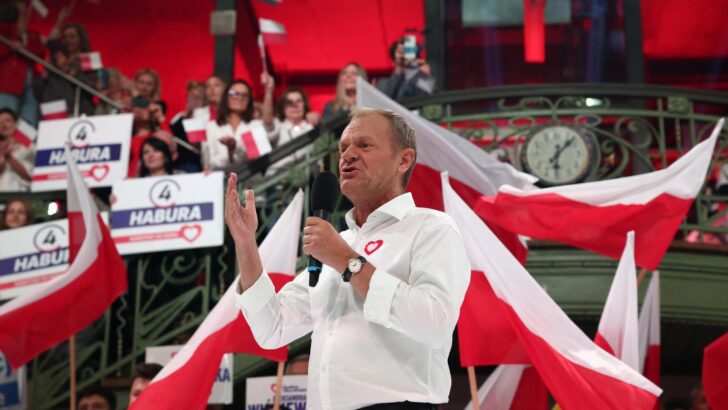Stefan Meetschen (KNA)
Restructuring of the public media, school lessons without homework, four drafts for a more liberal abortion law – since the majority of Poles voted for a change of policy last October, the centre-left government led by Prime Minister Donald Tusk (Civic Platform, part of the Civic Coalition electoral alliance) has been doing everything it can to implement the reform promises made during the election campaign at top speed.
Nothing and no one is being spared. Not even former Justice Minister Zbigniew Ziobro (Sovereign Poland), who was accused of unlawfully blurring the lines between the judiciary and legislature while still in office. With payments from the justice fund to a Warsaw priest and ex-exorcist dreaming of a media centre uncovered by the domestic secret service ABW, the controversial politician, who is suffering from cancer, has come under closer scrutiny by special investigators. Ziobro’s house has been searched. Will the rosaries of mercy prayed for his health on the right-wing Catholic radio station “Radio Maryja” help him?
In the view of the well-known historian and political commentator Arkadiusz Stempin, the new government deserves credit for its courageous crackdown. “For the first time since the fall of communism in 1989, Poland has a government that is tackling a number of social ills head on. Regardless of the mental barriers in many Polish minds,” Stempin told the Catholic News Agency (KNA). This is an absolute novelty. “This government is taking action and is not afraid of the uproar and resistance within society.”
The country’s Catholic Church is one of the forces that are unfamiliar with Tusk’s pace and his coalition’s eagerness to reform. With Christmas just around the corner, Tusk brought up the pension fund for priests, which for decades has guaranteed clergy pension privileges that other professions can only dream of. It is quite possible that the church fund will be dissolved and the church will be put on a completely new financial footing.
Religious education was also quickly raised as a topic of discussion by Education Minister Barbara Nowacka (Citizens’ Coalition) and Catholic book classics by the legendary Primate, Cardinal Stefan Wyszynski, and the later Pope, Karol Wojtyla, are to be removed from the school canon.
A progressive discernment of spirits? In ten years of PiS government, the traditionally open boundaries between faith and national pride in Poland have become even more blurred. “With the departure of PiS, the Church in Poland has lost its natural ally,” says Stempin and finds it remarkable that the new chairman of the Polish Bishops’ Conference, Archbishop Tadeusz Wojda, drew the attention of parliamentarians to the Church’s position during the vote on four liberal abortion bills at the beginning of April. As if the Church had a special authority when it comes to protecting life.
Yet the coalition partners Civic Platform, New Left and Christian-liberal Third Way know that none of the bills have a chance of becoming law as long as the president is Andrzej Duda. Even if the special commission set up to examine the draft favours the more moderate draft of the Third Way, the national-conservative president is the end of the line.
Which raises the question of who will succeed Duda next year. At the age of 67, the presidency could be Donald Tusk’s last piece of cream in his political career. But who will then moderate the colourful government? Even the still agile-looking man from Sopot cannot manage both prime minister and president at the same time. If Tusk curbs his personal ambition, the path to the presidential palace could be cleared for Rafal Trzaskowski, the mayor of Warsaw and Tusk’s party colleague. Trzaskowski has just won the mayoral election in Warsaw, which can be seen as an important popularity test, easily in the first round.
Similar problems are also familiar to the PiS, where Tusk’s eternal rival Jaroslaw Kaczynski recorded the result of the local elections on 7 April as a success for the national conservatives. The election results were the same as always: Civic Platform strong in the west and in the metropolises, PiS strong in the east and in the countryside. Kaczynski, who turns 75 in June, is also currently without a presidential candidate. In addition, the question of who could become the new PiS leader after him remains unanswered. Former Prime Minister Mateusz Morawiecki? Former Defence Minister Mariusz Blaszczak?
Tusk’s fast-track government is also setting new priorities in the field of foreign policy. In the age of the new world disorder, Polish Foreign Minister Radoslaw Sikorski, like his predecessors, is seeking proximity to Washington, but prefers President Joe Biden to Donald Trump. In Europe, Sikorski and Tusk are seeking proximity to France and Germany, breathing new life into the Weimar Triangle. The Visegrad quadrangle of four Eastern Central European states, which Kaczynski relied on for a long time, appears to have collapsed due to the pro-Putin Viktor Orban. Tusk also desperately wants the EU funds that were frozen during the PiS ice age.
“A new tone has entered Polish politics. The toxic pollination of the German-Polish area by the PiS is over,” Arkadiusz Stempin is convinced. Donald Tusk has also played his communicative part in this. Both internally and externally. He is a bit of a double Donald after all.


 Donald Tusk, the leader of the largest opposition grouping Civic Coalition, speaks at a meeting with women during the election convention in Lodz, Poland, Oct. 10, 2023, ahead of the Oct. 15 parliamentary elections. (OSV News photo/Kacper Pempel, Reuters)
Donald Tusk, the leader of the largest opposition grouping Civic Coalition, speaks at a meeting with women during the election convention in Lodz, Poland, Oct. 10, 2023, ahead of the Oct. 15 parliamentary elections. (OSV News photo/Kacper Pempel, Reuters) 